At BMJ, we bring more than just cash to help you grow and scale up, giving you access to our reach, influence and expertise.
Apply for investment support from BMJContact Anca Babor to find out how or complete an application form below
Five years ago, med-tech startup Oslr created a platform that connects doctors with medical educational opportunities at the bedside of patients in hospitals.
Oslr co-founder and Chief Operating Officer, Alan Pooley, leads Oslr’s digital business operations. Here he reveals how the company is still going strong in more ways than one.
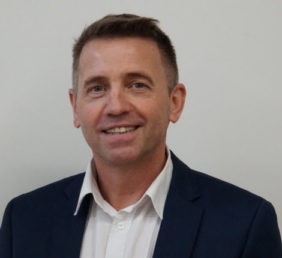
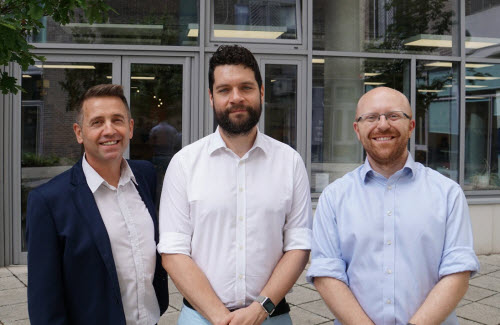
Alan Pooley comes from a tech background with a successful career that includes working for Apple, managing the iPhone, iPad, and iOS pre-release roll-out, to the main carriers in France, Russia, and Israel. He also holds an MBA focusing on Applying Agile in the Gig Economy and has completed the King’s20 Accelerator programme from the Entrepreneurship Institute.
Through a Greenwich university networking event, Alan met Oslr co-founders, Dr Tom Simpson Consultant Physician in Respiratory and General Medicine with an MA in Clinical Education, and Dr Adam Pennycuick a Registrar in Oncology, Doctor of Philosophy, and software developer.
Together, they developed a cross-platform application to help create connections within the clinical setting between students and consultants and other experienced, practising clinicians. The platform works by making it easy to find students and teachers, arrange the sessions, and enhance teaching with online learning resources. It also helps doctors easily collect feedback for their portfolios.

“Information for medical education is out there, but it’s the best delivery of that information in simulation with critical timing and relevance that creates an engaging and confident learning opportunity for the doctor.
Practical training is the crux of all medical education. This is the inspiration of Oslr.”
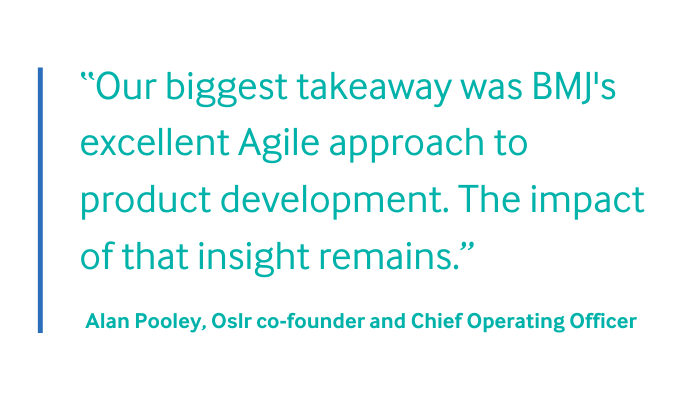
“BMJ gave us expertise and guidance, which continues to serve us today. They told us, ‘if you deliver medical education from that platform at that precise moment, then you have the most accurate route to market possible that you could ever have.’ This was encouraging because it gave us the confidence that it was very probable that what we were developing would be a success.
Our biggest takeaway was BMJ’s excellent Agile approach to product development. The impact of that insight remains. Still today, we model our working ethos against the clearly defined frameworks that we learnt from BMJ. Everything we develop has our customer at the core, and we refine our product based on their needs.
Five years later, I can say that this way of working is an essential factor in our sustainable business success. Our focus always comes back to having the end-user in mind and what is the impact. Obviously, the pandemic had a significant impact – covid-19 has created a deficit for medical education, and the effects on medical students will be far-reaching.
In March 2020, students were told to go home, so we were naturally alarmed when our usage flatlined that summer. But we resurfaced simply by taking the same agile approach that has continuously served us so well from the start.
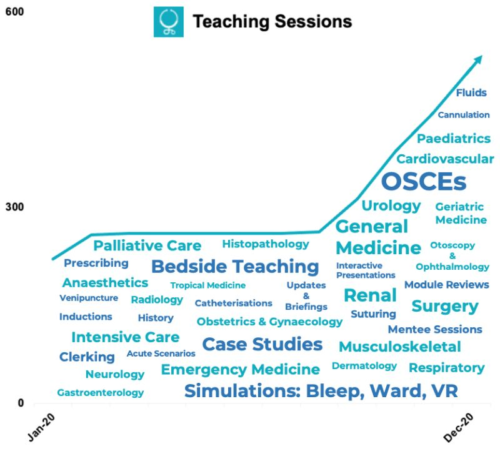
“First, we made our platform more relevant in the face of the pandemic challenges. We did this by adding peer-recommended Covid-19 educational material online with supporting video links. This move made us quickly realise this material would also support the social care sector.
We shifted our focus and found a growing need for improving workplace training in the social care sector. We responded by creating newer and more efficient ways for social care workers to learn the new skills required to enhance their daily practice.
Subsequently, we built a complete prototype platform for social workers, optimising the arranging and capturing of training experiences for continuing professional development, along with the ability to find and network with peers and share resources, such as case studies.”
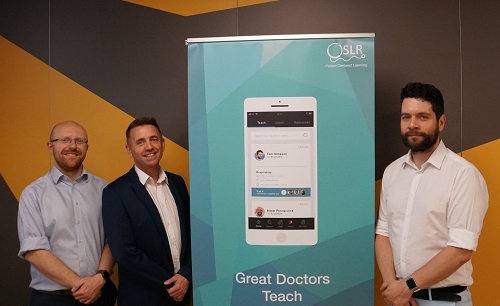
“Start with your customer: build user persona profiles and stories, only then consider what technology you can use to make his/life more manageable.”
Managing change within a company can be difficult, but the key is bringing staff along with you. They need to be engaged in what you are all trying to do and share the same values – something I refer to as brand citizenship. If staff go out of their way to build the brand, you have an engaged and loyal workforce.
Also, speak to your customers and build networks through peers to learn about needs and challenges. That way, you can develop concepts and the right resolutions to meet those needs.”
The best doctors incorporate teaching into their practice. Oslr makes it easy.
The digital startup was founded in 2015 by doctors frustrated at being unable to arrange essential bedside teaching. The goal was originally to link teachers with students, promote digital learning and collect feedback for portfolios. More recently, the team have repurposed its digital health platform in light of the covid-19 pandemic.
The technology will be adapted for use by staff in care homes and social care workers in the community, so they can be trained more efficiently to prevent contagion in these settings. The relationship between Oslr and BMJ during their initial prototype stage gave Oslr the tools, insights and confidence to take their innovative and truly transformational concept to a sustainable business model to support healthcare professionals across the UK.
Alan, Adam and Tom have published multiple papers between them, including:
Pooley, Alan and Chan, Jin (2020). A case study on the performance assessment framework for agile processes. International Journal of Business Performance Management doi: https://doi.org/10.1504/IJBPM.2021.112126
Pennycuick, Adam et al (2020). Immune surveillance in clinical regression of pre-invasive squamous cell lung cancer. American Association for Cancer Research doi: https://doi.org/10.1101/833004
Lavelle, Mary & Reedy, Gabriel & Attoe, Chris & Simpson, Thomas & Anderson, Janet. (2019). Beyond the clinical team: evaluating the human factors-oriented training of non-clinical professionals working in healthcare contexts. Advances in Simulation. doi:https://doi.org/10.1186/s41077-019-0101-1

Benefit from BMJ's reach, recognition and influence
Support for new talent to improve patient outcomes
Discover the 5 things we look for in a partner
Dedicated help to bring the best talent to the forefront
Our values define who we are and how we behave
BMJ is a global brand with a vision for a healthier world